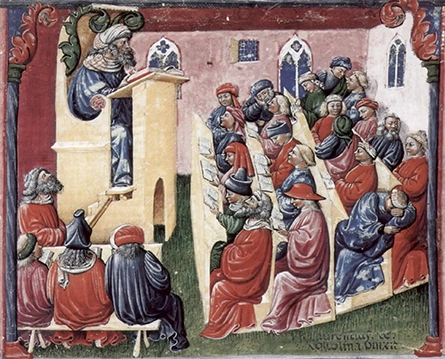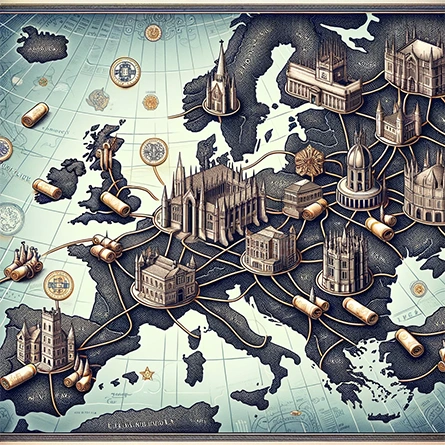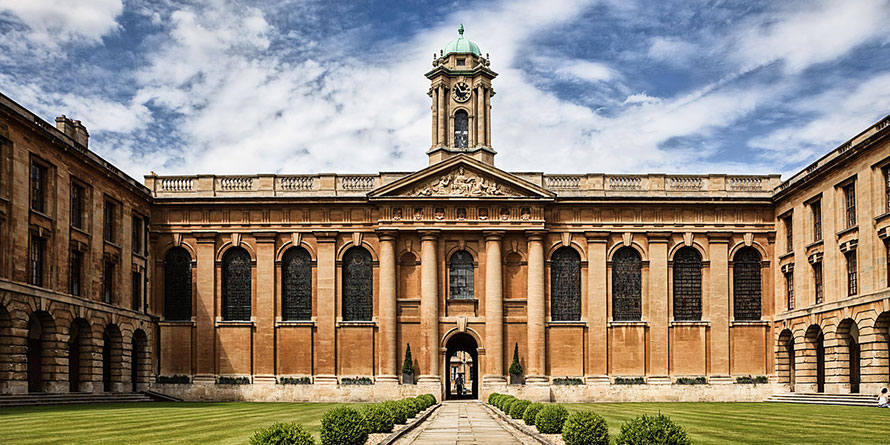University of Oxford founded in 12th century
Article written by Olivier Sérès
In the heart of the 13th century, the emergence of universities weaves a powerful network of knowledge, catalyzing student mobility across Europe. Two centuries later, Erasmus, the prince of the Republic of Letters, embodies this remarkable humanist movement.

University of Bologna, founded in 1088 – Master and students in the 14th century by Laurentius of Voltolina © Public domain
The bachelor’s degree emerged during this period, along with the first graduation ceremonies, accompanied by the awarding of a diploma.
The word “diploma” comes from the ancient Greek δίπλωμα / díplôma, meaning “folded in two”; originally, the official document was produced in duplicate on wax tablets, which were then folded to enclose the text inside before sealing and delivering it in a sealed envelope. One copy was stored in the archives, the other given to the recipient.
However, this system is not very secure: how could one prove the authenticity of the copy, and what to do in case the archived copy is destroyed?
In this context, is it possible today to create a convincing and unalterable digital twin, accessible on one’s phone?
The French decree of May 23, 2018, marks a turning point and authorizes the implementation of the Digital Diploma Attestation Service (SAND), whose purpose is to enable anyone to obtain online, in a dematerialized manner, the digital attestations of their diplomas and to send to one or more third parties a link to verify the authenticity of the diplomas they claim.
But what happens in case of a breakdown, an attack, or simply if the servers stop due to the bankruptcy of the educational institution?
To address these challenges of proof and resilience, MIT published a white paper in 2017 and established the first “diploma blockchain.” The two wax tablet copies are now replaced by files duplicated in distributed registers.
Particularly inspired by these efforts, the French University of Lille embraced blockchain technology in 2020, entrusting the digitization of diplomas, data extraction, and anchoring to the company BCdiploma. 56,000 diplomas from the University were thus stored in a blockchain within 2 years.
In 2023, the European Commission approved cross-border diploma management. This decision is part of the broader European identity verification program : EBSI Vector.
France needed to have a node of this infrastructure so that students graduating within its territory could, in Europe and beyond, produce indisputable attestations to enroll in other universities or apply for a job.
This has now been achieved, as EDF, wholly owned by the French state, announced this week that its subsidiary Exaion now hosts the first French node of the EBSI.

Thus, the Europe of Digital Diplomas is in motion, thanks to the resilience of the University of Lille, BCdiploma, and EDF.
Kudos to Perrine de Coëtlogon, Pierre Boulet, Luc Jarry-Lacombe, Gilles Deleuze, and Fatih BALYELI!
NB. In his speech on the Europe of Universities on June 29, 2022, Xavier Darcos, Chancellor of the Institut de France and Former Minister of National Education in France, clarified:
“Letters, sciences, and arts are neither French, English, Italian, German, nor Czech; they are all of these simultaneously, and even much more, for they are European, just as the allegories in Puvis’ Sacred Grove are European. To wonder whether Europe was born from the universities or the universities from Europe is to rekindle the futile debate of the chicken and the egg. Universities are by nature European, and Europe is inseparable from the life of the mind. When, in 1989, Europe began to consider the construction of an enhanced European university space, it did so in Bologna, on the occasion of the 900th anniversary of the foundation of the University of that city.”
